With politics as the new power profession, families are now joining the race. Compromising ideas and ideologies, the new trend is getting Kashmir closer to a situation when it will have its government basing its support in kinship and family cause instead of ideology and CMP, reports Shah Abbas
Ever since PDPs Tariq Hameed Karra trounced Dr Farooq Abdullah, the NC heavyweight, and scion of powerful Abdullah family, in Lok Sabha polls in 2014 summer, Mian Altaf Ahmad has had lot many sleepless nights. His close relatives switched over and campaigned for PDP’s Bashir Ahmad Mir. Facing not-so-responsive audience, even his family was unsure that Mian Sahab will retain the membership of the state assembly, a status that has been in the family since 1987, for 5 terms.
There was a huge whisper campaign against Mians’ of Wangat. They were accused of destroying the picturesque Sonamarg, forcing their own priorities on the developmental activities of the remote region and, most importantly, they were accused of sharing the booty of the Amarnath pilgrimage with their relatives on the other side of the mountains in Pir Panchal Valley – the districts of Rajouri and Poonch. But Mians fought and eventually made it by retaining the seat with a margin of 1432.
Eventually, Mian emerged more powerful. He won his seat in Kangan. His cousin Choudhary Akram won from Surankote. A Congressman, Akram is the son of veteran Gujjar leader Choudhary Mohammad Aslam and brother-in-law of Mian Bashir, Altaf’s father. Choudhary Aslam passed away in 2014 necessitating his son to take over.
But that was not alone. In neighboring Kalakote, Mians’ had another surprise – Abdul Gani Kohli, BJP’s only Muslim candidate making it to the party’s historic 25 mark in 2014 polls. Kohli’s is the son-in-law of Mian Bashir. Kohli was a civil engineer with the state government for 32 years and hawked specially his implementation of the water supply scheme of Vaishno Devi when he joined BJP in March 2014, abandoned NC forever.
After sleepless nights and painful autumn campaigning, Mians’ must be happy. They not only retained their influence but got two more and interestingly having an equal voice in NC, Congress and BJP. Custodians of the revered Gujjar shrine, Mians’ were never so-inclusive in politics in recent history!
Mians are not so exclusive. There are more families getting and controlling politics of J&K and many think the valley is gradually inching towards the medieval times when peripheral chiefs had their own fiefs and they all were relatives of each other. The impressive trend that unionist politics in J&K is exhibiting is that families are managing their pie of power and care too hoots for the ideology of it.
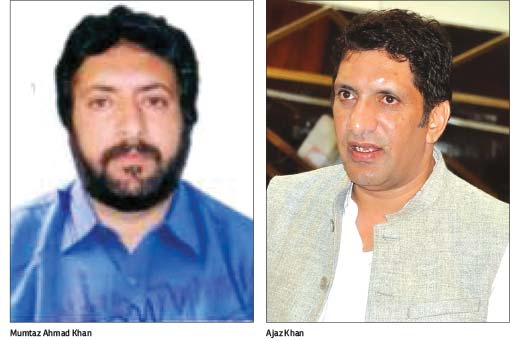 An interesting facet of the situation is that the families have taken over most of the politics, mostly in Muslim belts, as the ‘big’ families of Abdullahs’ and Muftis’ were in the limelight.
An interesting facet of the situation is that the families have taken over most of the politics, mostly in Muslim belts, as the ‘big’ families of Abdullahs’ and Muftis’ were in the limelight.
A preliminary assessment suggests 25 members of the newly constituted legislative assembly are close relatives of each other. The relations are across the lower house of the state legislature. These exclude the four of the six recently elected parliament members who have close relatives in the state assembly. Besides, there are three members in the house who are relatives of former members or ministers. And then 18 individuals have close relations with each other or with the elected lot failed to make it to the assembly in 2014. If one day, it happens that they all win, J&K’s 87-member assembly will have 51 members related to each other.
There are real brothers who have seemingly divided the houses within themselves. After Muzaffar Hussain Beig, former Deputy Chief Minister was elected to Lok Sabha, it was his nephew Javed Beig who was elected from Baramulla, retain the power for the family.
Even Karra did the same. Apart from contesting personally in 2008, Karra fielded his wife and sister-in-law Aseia Naqash, all from three different seats of Srinagar. They lost all the three seats. In 2014 summer when he defeated Dr Abdullah, he was termed to be king-slayer. Though he avoided fielded Mrs Karra in the assembly and chose a family loyalist instead, Asiea Naqash contested and won.
Columnist turned RSS man Dr Jintendra Singh Rana was pitch-forked to contest against Ghulam Nabi Azad, won and is one of the closest ministers under Prime Minister’s shadow in the PMO. Devender Singh Rana, his younger brother – albeit senior to his bro in politics, won Nagrota and made it to the assembly. Now elder brother is in Lok Sabha and younger one in the state assembly.
Rana’s Nagrota victory was actually on the ruins of another family – the Kishores’. Jugal Kishore, BJP’s state president, represented Nagrota twice and when in 2014 he was given the mandate for Lok Sabha, he wanted to pass on the seat in inheritance to his brother Nand Kishore. But he lost.
Look at the mountains embanking the Chenab between Batote and Banihal – the Gool belt in Reasi district, which veteran Gujjar leader Haji Buland Khan “ruled” for years. In June 2007 when he died at the age of 74, he had been a lawmaker 3 times and had already passed the leadership to his on Aijaz. But this time his brother Mumtaz also decided to try his luck in the elections and won. As Aijaz retained his Gool Arnas seat, Mumtaz is the first time lawmaker from Gulabgarh. So the Khan family is in control of the heights politically since 1977, leaving the seat to opponents just for one term in 1996!
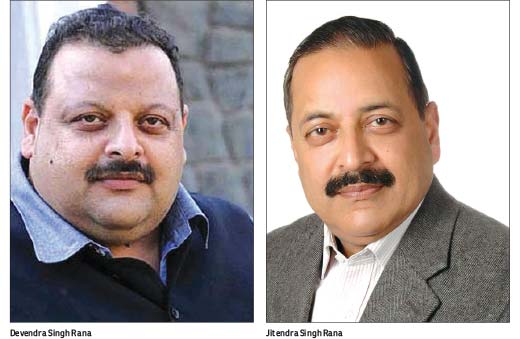 Wait a bit; these two brothers are not only having two votes in the Congress’s 12-seat mark. They have a third one too. It is Choudhary Zulfiqar Ali, the PDP man who retained his Darhal seat in Poonch for the second time. Their sister is Mrs Zulfiqar Ali.
Wait a bit; these two brothers are not only having two votes in the Congress’s 12-seat mark. They have a third one too. It is Choudhary Zulfiqar Ali, the PDP man who retained his Darhal seat in Poonch for the second time. Their sister is Mrs Zulfiqar Ali.
The trend does not cease to exist if one goes higher in altitude. Zanskar’s Rizvi family created a new record this year. Agha Rizvi has been a member of the state’s legislative council for almost six years now. He is an NC man. In 2014 assembly elections, all parties witnessed a sort of crisis in Ladakh, especially in Zanskar. Finally, NC decided to support an independent candidate Syed Baqar Rizvi. He eventually managed to win. As Omar Abdullah in Srinagar was counting him as one of his MLAs, Baqar had already shifted to a ‘safe house’ in Jammu. Finally, he joined the PDP lawmakers meeting and would be counted as theirs for the time being.
So the Rizvi’s of Zanskar would occupy one seat each in the upper and the lower house of the state. One seat will get vacant, however, within a few months.
Srinagar’s Ansaris’ are the new addition. Representing different parties in different regimes, business tycoon and cleric Molvi Iftikhar Hussain Ansari died in 2014 summer after a prolonged illness. While his well-read son Imran is expected to fill the vacuum at the level of religion, replacing him in politics was a heady task for PDP. So they fielded his brother Abid Hussain Ansari from Zadibal as Imran Raza Ansari decided to retain the Pattan seat, apparently as part of his legacy and political inheritance. Both of them won. Now it remains to be seen how many ministers the family will have in a single government?
While politicians have always said that people are the fountainheads of power, the history is vindicating the larger reality that this power has remained invariably concentrated to the families.
When Sheikh Mohammad Abdullah, Kashmir history’s most powerful politician eventually returned to power in 1975, he set a standard for family first. Begum Akbar Jehan was in parliament, and soon Dr Abdullah followed. This tradition was retained by his successors including Dr Farooq who passed on the legacy to his son Omar. Dr Mustafa Kamal, his other son has been in the assembly for many terms but lost in 2014.
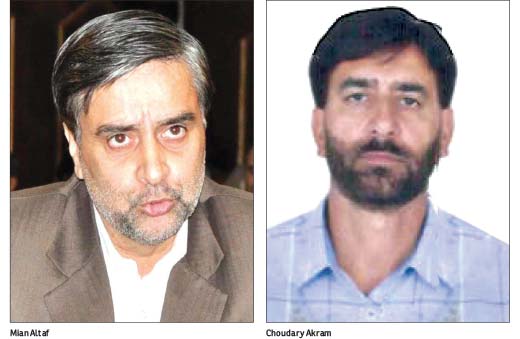 In 1996 assembly elections when Mufti Sayeed headed the Congress in the state, he sent his entire family to contest including his wife. Later, his in-laws joined him. Since 2002 his brother in law Sartaj Madni has been in the assembly representing Devsar and rose to the status of Deputy Speaker. This time, he lost. However, Mufti’s co-brother Syed Farooq Andrabi was elected from Dooru segment of Islamabad. He defeated Congress heavyweight, G A Mir, a former minister, and finally made it to the assembly. Andrabi had contested unsuccessfully in 2002 and 2008.
In 1996 assembly elections when Mufti Sayeed headed the Congress in the state, he sent his entire family to contest including his wife. Later, his in-laws joined him. Since 2002 his brother in law Sartaj Madni has been in the assembly representing Devsar and rose to the status of Deputy Speaker. This time, he lost. However, Mufti’s co-brother Syed Farooq Andrabi was elected from Dooru segment of Islamabad. He defeated Congress heavyweight, G A Mir, a former minister, and finally made it to the assembly. Andrabi had contested unsuccessfully in 2002 and 2008.
It happened at a time when PDP president Ms Mehbooba Mufti was elected to Lok Sabha. Father-daughter and Madni represented their clan in the assembly in 2002 and 2008 and now the only change is that Madni was replaced by Andrabi and Ms Mufti is in Lok Sabha. The important table talk in NC circles is that PDP leadership will get her back within the first year of the government and make her replace Mufti.
What leaders do, others follow. That is the thumb rule. Mohammed Dillawar Mir has been a veteran in politics till a CBI court inducted him at the most crucial juncture of his political career. The party had no option other than asking him to field his son as a candidate for Rafiabad and resign as secretary general of the party.
Now it is his son Yawar, who has emerged as the youngest lawmaker of the state. His sister, not many people know, is married to Syed Altaf Bukhari’s son. A business tycoon, Bukhari trounced NC’s Nasir Aslam Wani in Amirakadal segment of Srinagar. Interestingly, Dilawar’s brother-in-law, Nazir Ahmad Naikoo contested from Sopore segment on PDP ticket but lost to Congress.
There have been various instances in which the “political families” married their wards with each other that cemented the politics as well. NC heavyweight Choudhary Ramzan’s daughter is married in another NC leader, Nasir Aslam Wani’s family. Both the former ministers unsuccessfully contested the recent state polls. However, both are termed very close to party working president Omar Abdullah who is the third generation political heir of Abdullah’s after late Sheikh Mohammad Abdullah and Dr Farooq Abdullah.
The former cop who eventually replaced Omar Abdullah in Ganderbal, the so-called king’s constituency, is Ishfaq Jabbar. Son of a former minister, he was initially a Congressman and then joined NC and bagged the mandate at a time when Omar decided to move towards hills from plains. He won it. He is actually son-in-law of another NC leader and former minister Mohammad Sayeed Akhoon. Akhoon lost to PDP candidate in Hazratbal segment of Srinagar district.
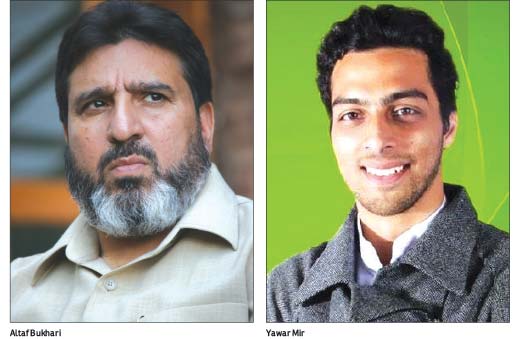 But the crisis of having closer relations running the party is much more in PDP than others. Peerzada Mansoor who represented Shangus till 2014 and lost to Congress is son in law of another PDP leader and former minister, Peer Mohammad Hussain. Hussain’s son, interestingly, is married to another PDP leader Dr Mohammad Shafi’s daughter who lost Beerwah where Omar won.
But the crisis of having closer relations running the party is much more in PDP than others. Peerzada Mansoor who represented Shangus till 2014 and lost to Congress is son in law of another PDP leader and former minister, Peer Mohammad Hussain. Hussain’s son, interestingly, is married to another PDP leader Dr Mohammad Shafi’s daughter who lost Beerwah where Omar won.
Chadoora veteran Javed Mustafa Mir, who succeeded his slain father Mir Musfata, has his sister married to MLA Chrar-e-Sharief Ghulam Nabi Lone’s brother. Javed is holding Chadora seat since 2002 for PDP while as Lone won the recent state election on PDP ticket. He defeated the record times winner Abdul Rahim Rather.
These relations interestingly create a situation that for many may not matter at all. Why should Dr Mustafa Kamal worry as long as his nephew Omar heads the opposition?
Veteran NC leader Abdul Rahim Rather lost for the first time in nearly four decades. Many think his party is partly responsible for the debacle as a campaign was let loose against him from the very first day. But why should he worry? His friend Mohammad Shafi won from Uri. Shafi’s daughter is Rather’s daughter-in-law.
Zahoor Ahmad Mir was forced into politics after militants killed his father in 2003. He has represented Pampore for all these years and won again, fighting a very channeling situation. For all these years, he was in the house along with Ghulam Hassan Mir, his close relative. Now, when Hassan Mir lost, why should the family feel the pain, as long as Zahoor is there?
There are lot many political faces who are second or third generation in politics. BJPs Hina Bhat is daughter NC M Shafi Bhat; Anayat Rather of Congress is son of a late Congress leader who contested from Homeshalibugh. Aijaz Ahmad Mir who won Wacchi for PDP is son of late NC leader Abdul Jabbar. Interestingly, in 2008 Mir’s sister was a candidate of NC from the same segment.
Sakina Itoo daughter of late NC leader Wali Mohammad Itoo contested from Noorabad constituency. Salman Soz son of Saif ul din Soz fought from Baramulla and Imran Nabi Dar son of late NC leader Ghulam Nabi Dar fought from Kulgam. Sheikh Mohammad Rafi contested unsuccessfully from Shopian constituency on NC ticket. Rafi is the son of late NC leader Sheikh Mansoor, assassinated in the early nineties.
Mangat Ram, an erstwhile Congressman shifted his loyalties and joined PDP in October 2014. His brother Rajnish fought the recent election on Congress ticket from Bani, while as Mangat Ram’s son Subash Sharma contested on PDP ticket from Kathua assembly segment.
Apart from the Sheikhs, Muftis, and Aghas of Kashmir the lone royal family of Jammu and Kashmir is also caught in an interesting web of political affiliation. A Congressman, the erstwhile Sadr-e-Ryasat Dr Karan Singh’s two sons, Vikramaditya Singh and Ajatshatru Singh recently joined PDP and BJP respectively. They contested the last election but unsuccessfully.
The politics in Kashmir has been exhibiting interesting trends. Bureaucratization of politics is a continuous process and it gives politics of the place a clear direction. It was followed by all the businessmen joining politics to consolidate and control power using big money. Now families are taking over the politics. Interestingly, PDP is not emerging the leader in seats and vote share only. It is leading the political landscape on all the three trends.
If all the political beings related to each other win polls, in 2020 there will not be the requirement of any alliance. The government will be formed by the relatives and kinship!!!


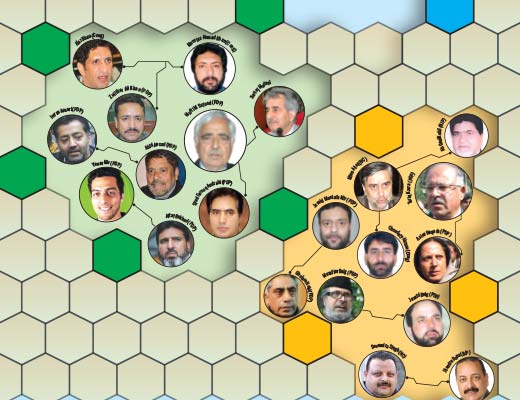














Since more than past sixty years what has flourished here in the name of “democracy” is actually a rule of kinships on the pattern of the rule of clans under so called long dead autocracy: It only changed it’s form didn’t it? All that democracy did for us was to coronate the new rajas and maharajas. Common, Abdullah’s still, I believe, lay claim to power as a matter of “rightful inheritance”. Collaboration of the elite and neo-elite is nothing new in our history. Hats off to Shah Abbas for this incisive piece. I would suggest for a further dig to unearth the details of the fortunes accumulated by the clans over the years. Let it be the reckoning now…All the best 😉